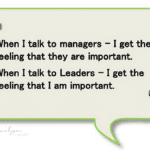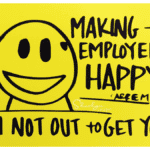Bullying is an important topic. There’s a lot of attention being focused on the subject of bullying these days. Especially in schools and the workplace. For that, I say “It’s about time.” Hopefully we will be able to do something to stop this destructive behavior.
But I also want to start a dialogue about the definition of bullying. Wikipedia defines it as “aggressive behavior manifested by the use of force or coercion to affect others.” They add that it can include verbal or physical harassment. It can also be directed at a person based upon race, religion, gender, sexuality or ability.
It’s important to have a good understanding of the definition of bullying. Because being tough or even being a jerk isn’t bullying. While sometimes tough bosses are labeled as jerks, there’s a difference. A difference we should all explore.
Honestly, there’s nothing wrong with being tough. I view tough as being objective and holding people accountable. In fact, sometimes I think we could stand a little bit more toughness in the working world.
And, I’m certainly not advocating being a jerk. Acting like a jerk has consequences. But there is a difference between being a jerk and a bully – even if it’s a very fine line.
In the book “Stop Bullying at Work” written by Teresa Daniel, the author cites research asking HR pros to explain the difference between being a tough boss and a bully. The book drew a distinction between what might be perceived as actions that were organization-focused as opposed to personally-focused. Meaning a bully’s actions are driven by self-interest and personal gain versus the tough boss whose actions are focused on the best interest of the organization.
This is an important conversation because we don’t want to restrict tough bosses because someone cries bully. And we can’t ignore claims of bullying just because the boss says they’re giving “tough love”. We need to be able to make objective evaluations and act accordingly.
I’d like to hear your thoughts on this. Is it possible to easily identify the difference between the person who is tough and a bully? Leave your thoughts in the comments.








Kevin Brozovich says
Sharlyn,
I think that the difference between bullies and tough bosses is the consistency of their approach. Bullies single out specific individuals for abuse, tough bosses consistently hold everyone accountable in a predictable way.
Personally, I have a lot of respect for bosses with high expectations. Bullies? There’s no place for them in the work environment.
Thanks for sharing another great article!
Richard Blake says
It gets very irritating at work if you have a boss who is a bully. But not all bosses are the same. Some are a little harsh with their employees but we can’t tag them as bullies. That is what makes the difference.
These are some very useful ways that you mentioned here to know whether your boss is a bully or not, and one needs to then act accordingly. I liked the book “Stop Bullying at Work” by Teresa Daniel. This shall help employees a lot to tackle the bullies at work.
Thanks for sharing.
-Richard
Lauren Shreve says
Thinking of my own experiences, there was a time that I had a boss that, he would characterize himself as being tough (and he was) but there were times where he seemed to take pleasure in others people’s discomfort.
The great bosses that I have had have expected great things and let you know it – providing feedback when you could have done better.
So I don’t think the line is that fine. The difference is as you say the character’s motivation. To build someone up or hold power through fear.
LebHR says
Interesting differentiation you have there which might be considered as truthful, the fact of self-interest, or company-interest. But again is company’s interest above all? what about employee-interest which does not contradict with company’s interest? We as humans need to consider at times the human reasoning behind some actions that employees take and our reaction as bosses or HR, whether these reactions are righteous or not even if the reaction is based on the higher interest of the organization.
Corey Feldman says
I’m not sure I agree. Constructive discharge could be done my a manager “thinking” they are acting in the companies interest without actually having a personal gripe. Some managers are to lazy or have to bad of an HR department to use corrective action effectively and resort to bullying to force a wanted turnover.
Sharlyn Lauby says
Thanks everyone for the thought-provoking convo! I think the comments about consistency and motivation raise interesting points. Maybe this is less about personal versus company interest and more about raising people up versus tearing people down.
It still leaves questions about the tough manager being able to hold people accountable without being accused of bullying. But could that come down to the way the message is being conveyed? Another reason communication skills training is so important.
Stacey Olson says
I agree with Lauren that someone who is exhibiting bullying behaviour is motivated by fear. The thing about bullying is that it is actions and behaviour therefor it can be changed. It takes a lot of compassion, coaching and a willingness from the person exhibiting the behaviours to recognize that they want more positive relationships in their life.
A bully acts from a place of self serving and negative fear and needs full control in order to avoid ending up in the fearful place. A tough manager acts from a positive vision and believes in his teams ability to reach that vision together.
Focus on the positive vision -how can we get there together?
A bully is focussed on external power, oppression, authority and control over others because they don’t have authentic power within. A tough manager has self worth and also wants others to have self worth, self esteem and be empowered too.
Focus on each other’s strengths and talents -what do you and each person on the team bring to the table?
A bully is compelled to diminish the success and inner wisdom others have because they fear it competes with their own external power. A tough manager will congratulate others successes because they know it contributes to the good of society as a whole and does not take away from their own inner strength and power.
Everybody deserves recognition for a job well done -how can you show your appreciation to those around you today?
A bully doesn’t take responsibility for their part or actions, they blame others. A tough boss will take responsibility for their part and their actions and will look for the lesson in a challenge to help them and their team become more successful.
We’re in this together -what will you do differently next time?
Scott Ziegler says
Lots of excellent responses above – I’m left wondering if my simple response is adequate.
Tough bosses set tough, consistent standards. Bullies have arbitrary standards that are inconistently applied and move based on their whims and moods. Bullies derive pleasure watching the chaos their actions cause. Bullies often target those who they know will not fight back.
Jacob Share says
Bullies talk down to you. Sometimes they threaten, sometimes they carry out those threats. But they never talk to you, on the same level.
Tough bosses talk to you. They will be very demanding, even unreasonably so, but they won’t treat you as less than human.
Nancy Kick says
It’s so difficult because many of the lines we want to draw are around the bosses intention, which we likely do not know. When we feel bullied we can’t believe that the boss isn’t doing it on purpose or gaining some pleasure out of making us feel less than. This reminds me of sexual harassment because it comes down to abuse of power. My example of a boss bullying me had to do with her not so subtle threats of taking away my flexible work schedule anytime she didn’t like what I said (basically when I didn’t agree with her in meetings).
Carol Fehner says
I think what differentiates high authority, high expectation workplaces from bullied ones is the focus on power for its’ own sake. Harvey Hornstein in his book “Bully Bosses and Their Prey” has a great survey that helps workers make this differentiation. It is this focus on power over the workers which makes the bully boss destructive and ultimately costly for the organization he or she is working for.
Brendan says
Bullying is in the process of losing its meaning – already, it’s becoming synonymous with “did something that I don’t like.”
Dan Olweus has done a lot of research on the topic on the school level and these are part of the definition that his curriculum uses:
A person is bullied when he or she is exposed, repeatedly and over time, to negative actions on the part of one or more other persons, and he or she has difficulty defending himself or herself.
Bullying can be distinguished from other kinds of aggression between students in a number of ways, but most obviously by the following:
(1) the negative behaviors are intentionally targeted at a specific individual (it isn’t an accident that this incident happened);
(2) the repetitive nature of bullying (it isn’t usually a onetime event); and
(3) the power imbalance between the students.
When it comes to work, the boss has an inherent power advantage. A non-bullying boss works within the rules and applies them consistently and fairly, including the times when the rules are most-fairly bent.
I think that the major difference, then, is that a bully-boss uses the organizational system to avoid responsibility, is capricious in the application of rules, and uses non-organizational power (such as personality cults and cliques) to conduct business that is ostensibly that of the organization but is more accurately that of the boss.
Stephen Booth says
A tough boss will treat everyone equitably and won’t hold some people to a higher standard than others without an objective reason. They will deliver both adjusting and affirming feedback as appropriate and will actively look for opportunities to deliver affirming feedback. Feedback will be based on observed behaviour and actions and focused on the actions not a judgement of the person themselves (i.e. “you did” not “you are”) but will allow the person to explain their rationale/motivation. A tough boss will accept that sometimes people do the wrong thing for the right reasons and help their directs to explore how they could have done better. They will accept that the past is past and be prepared to apologise if they have misread a situation, seeing an apology as a sign of strength . A tough boss will never describe themselves as a tough boss but will talk (with actions to back up the talk) about wanting to help people be the best they can be. They never hold someone accountable for something they didn’t have the authority (authority here encapsulates role power, skills/expertise, knowledge &c) to control. After feedback the direct will feel energised to do better and will feel they can take a chance.
A bully will treat people differently with no objective reason to do so. They will concentrate on adjusting feedback, rarely if ever giving affirming feedback except the odd bit to those they are not bullying, actively looking for opportunities to giving adjusting feedback. Feedback will be about the person rather than their actions (“You are”, “Are you a…?” or “What sort of idiot would…” vs “You did…”) and will not give the direct the opportunity to explain their rationale/motivation or will mock them for it. A bully will try to tear people down and is more interested in berating them for past behaviour than helping them find ways to improve. In particular a bully expects people to find their own way to improve and will not assist them, or only do so begrudgingly. A bully will refer back to past behaviour, the past is not past and will not apologise if it turns out they misread the situation, they see an apology to someone below them in the structure as a sign of weakness. They will describe themselves as a tough boss or even say “I’m not a bully, I’m a tough boss”. They hold people accountable for things they did not have the authority to control. After feedback a direct will feel fear of of doing wrong again and not want to take any chances.
A good barometer for if your boss is tough or a bully might be to imagine you made a decision based on the information available to you which turned out to be wrong because you didn’t have a piece of information. Specifically something there was no real reason you would know or maybe even good reasons you wouldn’t know (perhaps a decision made at your boss’s level or above that hadn’t been communicated yet). Would your boss approach it as just one of those things and help you resolve any fall out or would they hold you accountable?
Sharlyn Lauby says
Thanks to everyone for their insights. This is really a great conversation.
As Brendan mentioned, I struggle with some of the definitions being tossed around for the term “bullies”. Is it becoming a catch-all for bad communication? For example, if a person doesn’t take responsibility for their actions, does that make them a bully? No. It means they irresponsible.
And if your boss holds you accountable for something, does that make them a bully? No, it means they are making sure you know the performance standard and are meeting the expectation.
This is why getting our arms around the definition is so important. Because we can work with slackers, jerks, etc. and none of them be bullies. Granted, they aren’t the best co-workers to have…but that’s a different issue.
Again, maybe it comes down to delivery. Using the accountability example, I can see being held accountable in a negative and threatening way…and I can see holding someone accountable in a non-confrontational tone. Often they become “teaching” moments.
Lenne says
Hi there. I recently had (not so much a boss) but an upperclassman/senior at the nursing college who was to guide us through our practical internship call me a geek, call me socially retarded, among many other hurtful things that were irrelevant while giving me feedback. Would that be classes as bullying or simply just that this upperclassman doesn’t really like me personally? If its just a personality clash I can definitely suck it up, but if it’s workplace bullying, I simply cannot. What do you think?
Brendan says
I wouldn’t call Lenne’s situation a personality clash. It could be bullying but the precise classification may not be as important as how Lenne regards the comments – accurately, it sounds – hurtful and irrelevant and certainly not instructive, which sounds like the intended nature of this relationship.
Because I work with developmentally-disabled children and adults, I can tell you that there is a major movement to dump “the R word” mentioned in Lenne’s post, which may help her. In some circles, it’s taken as the equivalent of a racial slur.
As for me, I was just RIFed by a bullying boss – she has a little circle of informants/enforcers who had substantial off-duty connections with her (drinking buddies) and thus a fair bit of influence.
To me, the experience was one of bullying because official channels of authority were used to cover non-official channels of authority. Persons who were of the same organizational rank as I were able to gain organizational superiority through inappropriate means.
Does anyone know of a good book or two (or several) on this topic? I’m out of that job and that’s OK with me, apart from looking for work, but I would just like to learn some stuff so that it doesn’t happen to me again.
Sharlyn Lauby says
I took Lenne’s situation with me to the SHRM Annual Conference last week, hoping to gain some insight. Unfortunately, there wasn’t as much conversation about bullying as I would have expected. I hope we will see more discussion about this subject in the future. It’s hurtful to individuals and detrimental to organizations.
The book I mentioned in this post, “Stop Bullying at Work” does a good job of defining bullying. And discussing the differences between being tough and being a bully. I also found this article on Harvard Business Review on “Diagnose and Eliminate Workplace Bullying”.
Thanks for sharing your stories.
JR says
I recently experienced having a boss who, whenever she was stressed out about something, would take it out on her people by becoming harsher and more impatient than necessary. The first time this happened, I wrote it off as she was just having a bad day and it was a remote incident. The second time it happened, I realized it was a pattern with her. While there are many definitions of bullying, this kind of bullying could be defined victimizing people to harshness as dictated by one’s own moods and issues. Even if the boss is “right” in the instance, when the criticism becomes nasty or ovelry harsh due to external issues that have nothing to do with the situation, I think it makes them a bully. You can’t just come down hard on people at your whim.
Sharlyn Lauby says
Thanks for sharing JR. I too once worked for a boss who, when he was having a bad day, we were destined to suffer. In that situation, I found the flip side to be true. When he was having a good day…he was much more open to offbeat ideas and very giving of resources. In that situation, I never really thought of it as bullying.
nonhlanhla says
i feel like ive been bullied becouse they call me names that i dont like and people always think im a fool becouse of the respect i have for everyone in the office please tell me what to do coz it always makes me cry but i dont want to make them happy please help
Nancy says
I just lost my job because of a boss who is a bully. It has taken me a few days to get on top of this. I was fired for violating a policy (unwittingly) which fit into her narrative. I was there just 6 months and had so much on my plate that I didn’t take the time to sit back and figure out what was really happening. I now realize how terrified I was of being berated privately or publicly. She was highly manipulative and she was the CEO. I was on the executive team and I expected a partnership. I don’t think she knows what that concept means.
Sharlyn Lauby says
Hi Nancy. Thanks so much for sharing your story. You’re so right to take some time, process the situation and prepare to move forward.
jennifer says
Hi All – I’m just coming into this as I’m doing research as to whether I can classify my boss as a bully or not. I work for a very small company and I report directly to the owner. In the beginning we were very close and worked well together. However, I also worked very very late hours for little pay (I was a young professional trying to build good will and show my work ethic). After years, I have slowly pushed back to have a normal work-life balance (i.e. no responding to texts at midnight for non-urgent items, leaving at a fairly decent hour when my boss arrives 4 hours late for a meeting at 6pm, etc). Over this process, my relationship with my boss has become more and more strained. She is very inconsistent with her reasoning for tasks (if I follow a specific method one day it is ok, if I follow the same method the next day, I am wrong and I should have “used common sense”). She is very mood and I cannot gauge if something was done correctly and how to proceed in the future. Previously, if I made a mistake, I would own up to it directly but now I am more reluctant. After acknowledging my mistakes, I would have to apologise for them over and over, sometimes for up to six months after the event. A lot of times, these mistakes rise from lack of communication and clear objectives.
Most of the emails I receive from her are in all capitals letters and often contain phrases like: “DO YOU HAVE ANY CONTROL IN THIS????!!!!!!!!!!!!!!!!!!!!!!!” or ANY COMMON SENSE?!?!!! Many times these situations are brought by a lack of clarity in directions. When I try to explain the event, she walks out of the room and chalks it up to me not understanding her.
She holds me accountable for information discussed in meetings when I was not even present for the meeting. Then she tells me that I must just not remember this meeting and logs it in a file of “things I forget.”
Lately, she has decided that I have a “comprehension issue” and that I do not understand what she is saying. Honestly, I am a very communicative person and being told I have “comprehension issues” is very offensive to me. I explained that when she uses this phrase towards me, I feel as though she is saying I am not intelligent.
There is no consistency in her orders and she allows some workers certain benefits while others, not. She has unrealistic expectations (she takes pride that she sleeps 3 hours a night b/c of work and skips lunch) and expects us to always be available.
In dealing with outside sources, I am usually able to finesse them to stay on with us a little longer – My boss is so demanding that we cycle through sources every two years – the first year they think is a fluke and after promises from her to improve in the next year they sign on again. After another year of the same, they say they cannot work with us any longer. It is the same pattern for everyone that she comes in contact with.
I feel that I get the brunt of her negativity because I am direct and strong in my comments back to her – I try to be decisive and explain the reasoning behind the decisions. My coworkers tend to disengage by rolling their eyes and being silent.
After years of this, I feel as though it has weighed on my view of my own performance. I am noticing lately that she is giving my responsibilities to others and has told me that if I’m not interested in the time and level of responsibilities of my position that she can place me in another role that would be more suitable, i.e. answering the phones.
During my time, I have streamlined a huge amount of the processes and have overhauled our claims process. I have also added clarity to our methods. I am a very good worker and I have a huge work ethic. Working under my boss is destroying any semblance I have of self-esteem which is affecting what I feel I am capable of handling when I apply for other roles outside of my company. I’m starting to think that I cannot do good work elsewhere from this constant negative feedback.
From all of this post, my main thing is, is my boss a bully? Or, am I just working for someone that is tough? I’m sure this questions seems silly now that I read it myself as well… I suppose that I have been at this company for so long that I cannot tell if, as they say, “the pot is boiling” or not. This behaviour has become a certain normalcy for me so it is difficult to tell what is acceptable and what is bullying. My coworkers have tried to hold discussions with her but it usually ends up in a meeting about how we are all not performing and that she needs us to be “smarter.” All have threatened to quit (not to her but mentioned it to each other) but the economy is so tough with new jobs that it is difficult.
All this being said, any advice or any comment on the situation? Am I out of touch and is she just tough or am I being victimized? Any advice on how to handle this? I have tried to distance myself from it but I care about my work quality that I strive to do a good job and show her this.
What do I need to change about myself for allowing myself to be subjected to this behaviour for so many years and how can I avoid this in the future? I am putting the rest of my efforts towards finding a new job as this situation will not change. Thank you kindly.
Brendan says
There is probably bullying here but it’s just one of lots of problems. Here’s just a few of the fragments that I caught:
(1) “Comprehension” is a way of calling you stupid and/or incompetent. It’s one of those “good reasons” that mask real reasons for firing someone. Why would I keep someone who had been working for the company for years but didn’t understand the job?
(2) “Common sense” – first of all, it’s not really common – if it were then no one would talk about it – but the point is that there is no point to asking someone if that person has common sense or not. If I think that you don’t understand then I will proceed accordingly.
(3) I think that 1 & 2 are forms of manipulation that are working pretty well on you and so they continue.
(4) However, if you stop playing along with 1 & 2, which is to say, if you get off this person’s emotional rollercoaster, then my guess is that you get fired. As you said, things were good there when you played along with everything but now that you are setting boundaries, you are drawing fire. If you stop playing along entirely then, I think, you have no role there.
(5) If you want to stay then you might follow the example of the colleagues who remain silent. Right now, you are conspicuous during a crisis and that is never a good idea.
(6) If you want to leave, that’s probably a good idea. Unless/until then, take your own notes of these meetings and every contact with your boss and keep those notes and copies of these emails off-site. Don’t let her become aware of this – just do it.
Sharlyn Lauby says
I agree with Brendan – there’s a lot going on here and it’s complicated. Hypothetically, you can ask yourself 2 questions.
1) If this is bullying, how would you handle it?
2) And if it’s not bullying – your boss is just being a jerk – how would you handle it?
My point is…would it be the same or different?
Brendan says
I’m most clear that Jennifer is being manipulated.
What is the purpose of statements like, “You’re incompetent” or “You have no common sense?”
When a manager believes that an employee is incompetent then the first response is to increase the employee’s level of competence. If that fails after a reasonable period with reasonable effort then the manager reassigns or releases the employee.
From Jennifer’s description of things, she doesn’t sound incompetent, and so statements like that amount, again, to establishing “good” reasons to mask real reasons and to manipulation.
To the extent that bullying is an illegitimate exercise of power, it’s the same as manipulation, which is intrinsically aggressive.
I like where Sharlyn takes this because there’s no way of really sorting it all out online: what difference does it make if this is something that fits into the classifications of bullying, manipulation, or a boss who is a jerk?
You can call this anything you want – you can even call it a hamburger but would you want to keep eating it?
Sharlyn Lauby says
@Brendan – you knew you’d capture my attention with a hamburger analogy. ha.ha.
Brendan says
Where I am, in the Philadelphia suburbs, you can get a good burger at Zac’s, Jake’s, or 5 Guys.
I also discovered great tacos at Moe’s Southwest Grill and part of what I like about the place is the spirit of the company. All guests are greeted with a chorus of “Welcome to Moes!” from the first staff person who notices, and then by the rest.
The company newsletter is on every table and I can see that Moe’s celebrates birthdays and date-of-hire anniversaries. The company is overtly and proudly green and the food is really good and reasonably priced ($12.00 for 2 big tacos, a soda, chips and cheese, and a cup of Carvel soft ice cream).
The staff are pleasant – not the edgy bitterness that you often see in low-pay low-esteem jobs. It’s probably still not where anyone but a restaurant manager really wants to be, but it seems like a decent place to work.
Sharlyn Lauby says
Hey Brendan. We’re off topic here but I need to know where to get the best cheesesteak…feel free to send me an email slauby [at] hrbartender dot com.
Duncan Brodie says
Good article.
I would support the view that there is a big difference between holding people to account for what they have agreed to deliver and bullying.
I worked for many bosses over the years who set high standards, were demanding and at the same time were supportive. For me there is nothing wrong with high expectations and holding to account provided you also will support when necessary.
Sharlyn Lauby says
Well said, Duncan. Thanks for the comment.